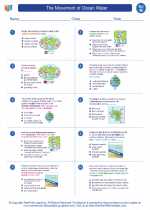Tropical Rainforest
A tropical rainforest is a type of biome found in the tropical regions near the equator. These regions are characterized by high levels of rainfall and constant high temperatures, creating an environment that supports a diverse range of plant and animal species.
Climate
Tropical rainforests have a hot and humid climate with little variation throughout the year. The average temperature is around 25°C (77°F) and the annual rainfall can exceed 2500mm (100 inches).
Flora and Fauna
The rainforest biome is home to an incredible diversity of plant and animal species. It is estimated that around 50% of the world's plant and animal species are found in tropical rainforests. Some of the iconic species include the jaguar, anaconda, toucan, and various species of monkeys and frogs. The vegetation is characterized by tall trees, epiphytes, and dense undergrowth.
Importance
Tropical rainforests play a crucial role in maintaining the global ecosystem. They help regulate the Earth's climate, provide a home for countless species, and are a source of many important resources such as medicines, food, and raw materials.
Threats
Despite their importance, tropical rainforests are under threat from deforestation, climate change, and illegal poaching. The loss of these vital ecosystems has significant implications for the planet's biodiversity and overall health.
Study Tips
- Focus on understanding the unique climate and biodiversity of tropical rainforests.
- Use visual aids such as diagrams and maps to help grasp the complex structure of the rainforest biome.
- Make connections between the importance of rainforests and their current threats to fully appreciate their significance.
◂Science Worksheets and Study Guides Eighth Grade. The Movement of Ocean Water

 Worksheet/Answer key
Worksheet/Answer key
 Worksheet/Answer key
Worksheet/Answer key
 Worksheet/Answer key
Worksheet/Answer key
 Vocabulary/Answer key
Vocabulary/Answer key
 Vocabulary/Answer key
Vocabulary/Answer key
